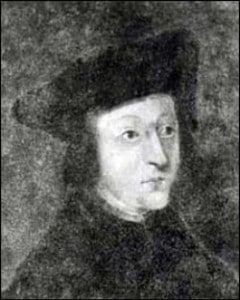 On Tuesday 18th April 1536, the Imperial ambassador, Eustace Chapuys, met Anne Boleyn in the chapel of Greenwich Palace. He had refused the offer of visiting Anne and kissing her hand, claiming that such “a visit would not be advisable” and begging Cromwell to excuse him, but the King had other ideas.1 George Boleyn, Lord Rochford, conducted the ambassador to mass and manoeuvred him behind the door through which Anne would enter. As Anne entered with the King, she turned, stopped and bowed to Chapuys. Chapuys had no choice but to bow in return. Chapuys recorded this event in a letter to Charles V:
On Tuesday 18th April 1536, the Imperial ambassador, Eustace Chapuys, met Anne Boleyn in the chapel of Greenwich Palace. He had refused the offer of visiting Anne and kissing her hand, claiming that such “a visit would not be advisable” and begging Cromwell to excuse him, but the King had other ideas.1 George Boleyn, Lord Rochford, conducted the ambassador to mass and manoeuvred him behind the door through which Anne would enter. As Anne entered with the King, she turned, stopped and bowed to Chapuys. Chapuys had no choice but to bow in return. Chapuys recorded this event in a letter to Charles V:
“I was conducted to mass by lord Rochford, the concubine’s brother, and when the King came to the offering there was a great concourse of people partly to see how the concubine and I behaved to each other. She was courteous enough, for when I was behind the door by which she entered, she returned, merely to do me reverence as I did to her.”2
Paul Friedmann, in his 1884 book “Anne Boleyn”, writes that “a good many people who had hoped that Chapuis would be rude to his former enemy were grievously vexed, and Mary herself was astonished when she heard that the ambassador of the emperor had bowed to ‘that woman’.”3 Friedmann cites a letter from Chapuys to Granvelle, in which Chapuys writes:
“Although I would not kiss or speak to the Concubine, the Princess and other good persons have been somewhat jealous at the mutual reverences required by politeness which were done at the church.”4
Chapuys downplays the event as a show of mere politeness, but it is clear that he was manipulated into the display.
Notes and Sources
- LP x. 699
- Ibid.
- Friedmann, Paul (1884) Anne Boleyn: A Chapter of English History 1527-1536, Volume II, p231
- LP x. 720